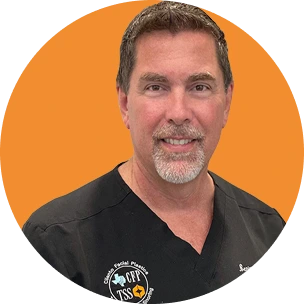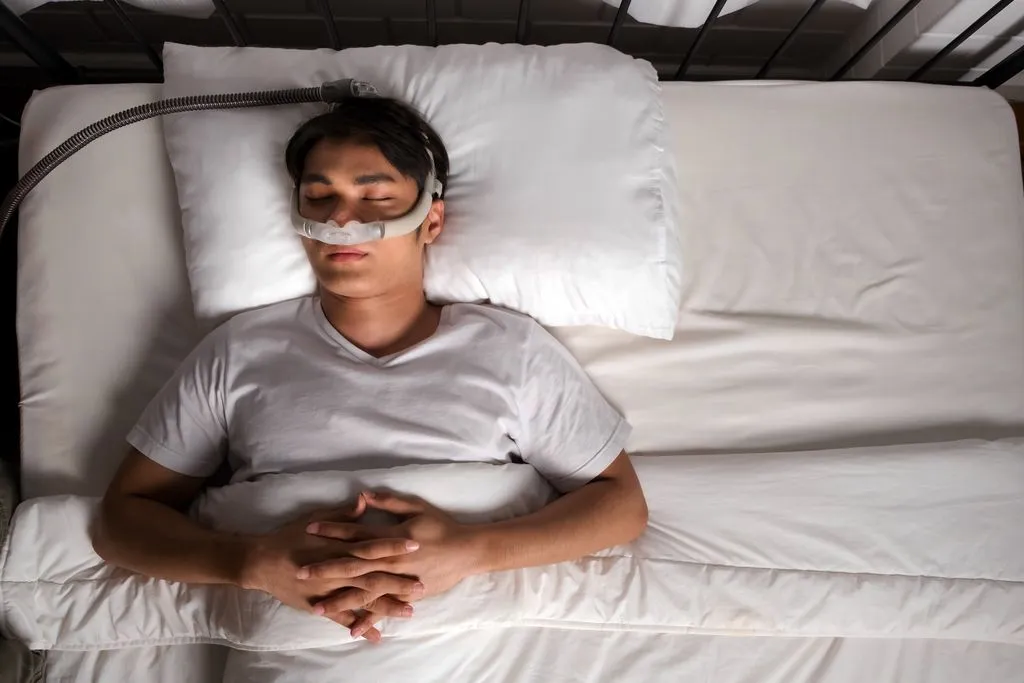Tips for Reducing CPAP Noise Impact
Reducing CPAP noise contributes to better sleep for the user and can benefit anyone else sharing the sleeping space. Here are some tips to ensure your CPAP machine is seen, not heard.
Finding the Perfect Fit: CPAP Mask and Machine Settings
A properly fitted mask is crucial for minimizing noise. If the mask is too loose, air can escape and cause a variety of sounds. Conversely, a mask that’s too tight may cause discomfort and disrupt sleep. Take the time to adjust your mask and straps so they’re snug without being overly tight. Besides that, your machine settings may need tweaking. Many CPAP machines come with adjustable settings that can reduce noise, like ramp functions that gradually increase pressure, making the initial operation quieter.
Accessorize for Silence: Anti-Vibration Mats and Other Gear
Accessorizing your CPAP setup can make a world of difference. Anti-vibration mats, for example, can dampen the noise by absorbing the vibrations between the machine and the surface it rests on. Additionally, hose covers can muffle the sound of air flowing through the tubing, and specialized CPAP pillows can enhance mask fit and comfort, thus reducing potential noise.
Simple Adjustments for a Quieter Sleep Experience
Often, the solution to a noisy CPAP machine lies in simple adjustments. For instance, placing your CPAP machine on a soft surface can significantly reduce noise. This can be a towel or a foam pad that absorbs sound and vibration. Furthermore, ensuring the air intake area is not blocked by bedding or other materials can prevent the machine from working harder and creating more noise.
Room Setup and Environmental Factors
Where you place your CPAP machine in the room matters. Keeping it at a lower level than your bed can reduce the perceived noise, as can positioning it away from hard surfaces that reflect sound. If you’re still troubled by noise, consider using a white noise machine or earplugs to mask the sound of your CPAP machine.
Understanding and Utilizing Device Features for Sound Reduction
Modern CPAP machines come with a variety of features designed to minimize noise. For example, some have ‘whisper technology’ or similar advancements that make the machine’s operation nearly inaudible. Familiarize yourself with your machine’s features – you might find a ‘quiet mode’ you didn’t know existed.
Benefits of Quiet CPAP Machines
Compact and Lightweight Design
Quiet CPAP machines are often engineered with a compact and lightweight build, making them easier to integrate into your nightstand setup or take on the go. Most CPAP masks pair comfortably with these streamlined machines, offering a user-friendly experience. However, it’s important to note that there is no universal mask compatibility, so it’s essential to ensure your chosen mask works properly with the machine you’re using. Still, the smaller size and quieter performance make these devices ideal for minimizing bedroom clutter while maintaining effective therapy.
Health Benefits
Reducing CPAP machine noise does more than just improve comfort—it can enhance the health outcomes of your therapy. CPAP devices treat obstructive
sleep apnea by maintaining open airways through continuous airflow. When the machine operates quietly, users are less likely to be disturbed by noise during sleep, which helps maintain longer, uninterrupted rest. Better sleep consistency directly supports cardiovascular health, cognitive function, and daytime alertness, which are especially crucial for those managing obstructive sleep apnea.
Better Sleep for Partners (Especially if They Are Light Sleepers)
A noisy CPAP setup doesn’t just affect the user—it can also disturb anyone sharing the room. For light sleepers in particular, even minor sound disruptions can impact rest quality. Using a machine with a quiet mask and low-decibel operation helps create a calm sleep environment, allowing both individuals to enjoy a more peaceful night’s sleep. Investing in a quiet CPAP system benefits everyone in the bedroom, fostering better sleep hygiene and fewer nighttime interruptions.
Improved Compliance
When therapy feels seamless and non-intrusive, patients are far more likely to stick with it. Machines with whisper-quiet operation make CPAP less bothersome, encouraging consistent use night after night. Pairing the device with one mask that fits comfortably and seals well can significantly reduce frustration and sound-related complaints. This combination of quiet performance and personalized fit promotes better long-term compliance, ultimately leading to more successful treatment outcomes.
Travel Friendly
Quiet CPAP machines aren’t just for home use—many are built with travel in mind. For instance, Transcend Micro Auto CPAP machines are among the quietest travel CPAP devices available today, offering reliable performance without drawing attention in a hotel room, airplane cabin, or shared space. Their lightweight design, combined with minimal noise output, makes them ideal for frequent travelers who want to stay consistent with their therapy while enjoying restful sleep on the go.
Frequently Asked Questions (FAQs)
As someone who might be considering a CPAP machine or already using one, you may have questions about keeping it running quietly. Let’s review some of the most frequently asked questions to clarify all issues.
How often should I replace CPAP parts to maintain quiet operation?
Regular maintenance is key to keeping your CPAP machine operating quietly. Generally, you should replace the air filter every month or as the manufacturer recommends. The mask and tubing must be replaced every 3 to 6 months. Worn parts can lead to noise, so keeping up with replacements is crucial for a quiet machine.
Can a CPAP machine be too quiet?
While it may seem odd, some users find an ultra-quiet CPAP machine disconcerting because they are accustomed to the sound as a sign that the machine is working. However, most people adapt quickly to a quieter machine, which shouldn’t be a cause for concern as long as you’re still receiving effective therapy.
What is a CPAP muffler?
A CPAP muffler is an accessory designed to reduce the sound produced by air moving through the tubing of your CPAP machine. It acts as a sound suppressor, softening the whooshing or hissing noise some users experience, particularly if their setup includes longer hoses or higher pressure settings. While not standard on most devices, mufflers are a simple add-on that can make a significant difference in comfort, especially for those sensitive to sound as they fall asleep. Many newer machines already have advanced sound reduction features, but a muffler can offer an extra layer of quiet.
Do insurance companies cover the cost of quieter CPAP machines?
Insurance coverage for CPAP machines varies by provider and plan. Most insurance companies will cover the cost of a CPAP machine if it’s medically necessary, but they may not cover specific brands or models. It’s best to check with your insurance provider to understand what your policy covers.
Is there a difference in noise levels between CPAP, APAP, and BiPAP machines?
There can be slight differences in noise levels between CPAP, APAP, and BiPAP machines due to their varying mechanisms of action. However, technological advancements have minimized these differences, and many modern machines across all types are designed to operate quietly.
How can I test my CPAP machine’s noise level at home?
To test your CPAP machine’s noise level at home, you can use a sound meter app on your smartphone. Place the phone near your machine while it’s running and compare the decibel reading to the manufacturer’s specifications. This can help determine if your machine operates within normal noise levels.
What is an auto altitude adjustment?
Auto altitude adjustment is one of the advanced features available in certain CPAP machines that allows them to automatically detect elevation changes and adapt the air pressure output accordingly. This is particularly useful for travelers moving between low and high altitudes. Without this function, a machine may deliver inaccurate pressure levels, especially in higher altitude areas, which could lead to discomfort or reduced therapy effectiveness. With auto adjustment, your machine maintains consistent support—even at higher pressure settings—helping you fall asleep without noticing any difference in performance.
Should I choose a CPAP model with an integrated heated humidifier?
Many users find that a CPAP model with an integrated heated humidifier improves comfort by preventing dryness and irritation during therapy. Most CPAP machines now offer this option, and when paired with heated tubing, the result is more effective moisture control. Additionally, some machines include waterless humidification systems, which are helpful for travel or areas with limited access to clean water. For the best experience, look for models with reliable power and consistent performance to ensure your humidification stays steady throughout the night. These machines often provide detailed therapy data as well, helping you track and manage your progress effectively.
Is it better to choose breathable foam earplugs or silicone earplugs?
When deciding between breathable foam earplugs and silicone earplugs, each has advantages depending on your needs and sleeping position. Foam earplugs offer a slight edge in overall comfort, especially for side sleepers, due to their softness and ability to expand and mold to the ear canal. Silicone earplugs, on the other hand, are more durable and can provide a tighter seal against noise. Choosing the right type can help you block out residual machine sounds and support uninterrupted rest, which are beneficial for maintaining steady therapy progress.





